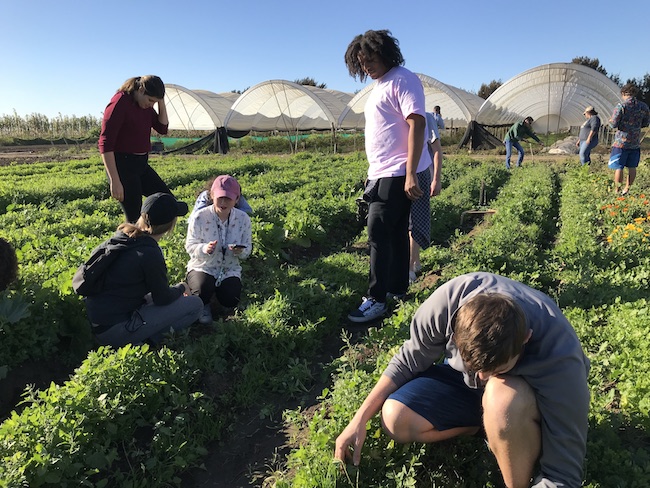
This year The FruitGuys Community Fund selected 15 small farms and agricultural nonprofits to receive a total of $53,471.96 in grants. We’ve just received interim report updates from the grantees and are thrilled to see the progress they’ve made this season!
The 2019 Grantees
The 2019 grantees are: Wilderness Greenhouse, near Homer, AK; Robina’s Organics in Salinas, CA; Fresh Roots Farm in Polson, MT; Sankofa Farm in Cedar Grove, NC; Scott Farm in Dummerston, VT; Many Forks Farm in Massachusetts; Windswept Acres in Chino Valley, AZ; Huidekoper Ranch in Wilson, WY; Sisterland Farms in Port Angeles, WA; DoLittle Pastures in Lacomb, OR; Funks Grove Heritage Farm in McLean, IL; La Semilla Community Farm in Anthony, NM; Veteran’s Employment Basecamp in New Bern, NC; JSM Organics in Aromas, CA; SweetRoot Farm in Hamilton, MT
Wilderness Greenhouse
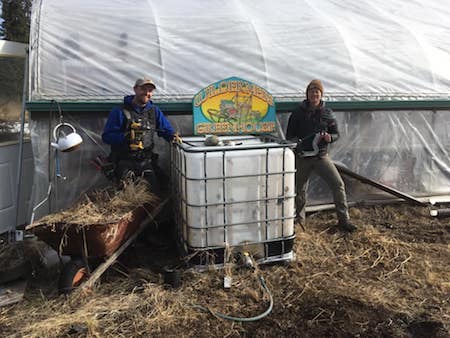 Wilderness Greenhouse is a 1-acre farm near Homer, Alaska, that produces seasonal vegetables, edible hanging baskets, and fresh salsa. They received a $2135.62 grant to purchase supplies to expand their water catchment system, cover crop seeds, set up a vermicomposting system, and transition to Korean natural farming methods.
Wilderness Greenhouse is a 1-acre farm near Homer, Alaska, that produces seasonal vegetables, edible hanging baskets, and fresh salsa. They received a $2135.62 grant to purchase supplies to expand their water catchment system, cover crop seeds, set up a vermicomposting system, and transition to Korean natural farming methods.
So far, they’ve installed a new gutter system, two holding tanks, and a high-flow pump. They also purchased and installed their vermicomposting system. Their system houses over 1500 red wiggler worms, and they’re looking forward to their first worm castings soon. Additionally, they’ve started to work on transitioning to Korean natural farming methods, as well as purchasing , fabric, and row hoops, which the owner, Tracy, said allowed them to plant three weeks earlier than in past seasons.
Robina’s Organics
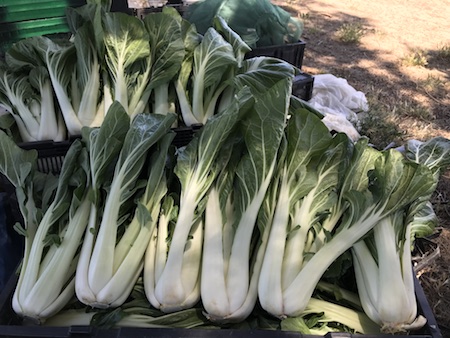 Robina’s Organics, a 1-acre farm in Salinas, CA, produces mixed vegetables and specialty Asian greens and herbs. They received a $4500 grant to install a small hoop house, invest in pest control and pollinator habitat, and expand their ongoing practice of intercropping their major crops, like Napa cabbage, spinach, and broccoli.
Robina’s Organics, a 1-acre farm in Salinas, CA, produces mixed vegetables and specialty Asian greens and herbs. They received a $4500 grant to install a small hoop house, invest in pest control and pollinator habitat, and expand their ongoing practice of intercropping their major crops, like Napa cabbage, spinach, and broccoli.
Farm owner Robina Bhatti said they’ve had a very successful year, thanks in part to the changes they’ve made. Their investments in season extension and natural pest control have made an immediate impact. Bhatti told us, “This season’s planting of Green Napa cabbage, with the support of The FruitGuys Community Fund award, was our most successful one yet.” They’re also looking forward to hosting a global ecology course this fall, in which students will learn about the farm’s sustainability and integrated pest-management practices.
Fresh Roots Farm
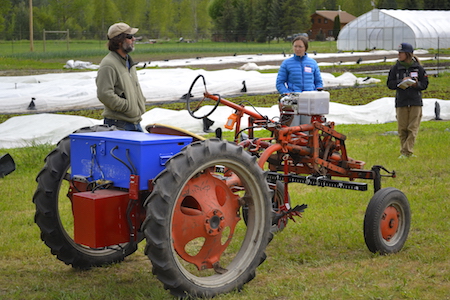 Fresh Roots Farm, a 5-acre farm in Polson, MT, produces certified organic vegetables, fruits, and seeds. They received a $3,725 grant to convert their Allis Chalmers G tractor to 48v electric.
Fresh Roots Farm, a 5-acre farm in Polson, MT, produces certified organic vegetables, fruits, and seeds. They received a $3,725 grant to convert their Allis Chalmers G tractor to 48v electric.
Despite having the additional work of repairing a broken axle on the tractor, Fresh Roots Farm was able to complete the conversion and begin using their electric tractor this season. Farm owner Karl Sutton said, “The tractor works fantastically!” He was able to use it to cultivate approximately three acres of crops this year. The farm already has a solar array, so this conversion greatly reduces their reliance on fossil fuels.
Sankofa Farm
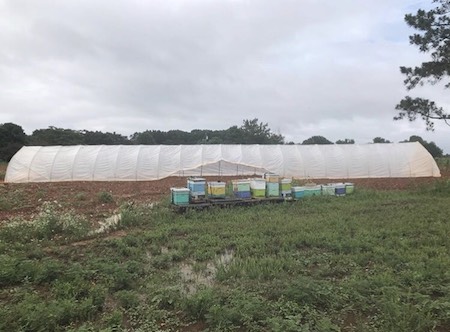 Sankofa Farms, a 2-acre farm in Cedar Grove, NC, produces vegetables, chicken, quail, and duck eggs. They received a $2,900.39 grant to increase their honey bee production and purchase a caterpillar tunnel and low tunnel supplies.
Sankofa Farms, a 2-acre farm in Cedar Grove, NC, produces vegetables, chicken, quail, and duck eggs. They received a $2,900.39 grant to increase their honey bee production and purchase a caterpillar tunnel and low tunnel supplies.
They’ve successfully completed their projects and are looking forward to planting in their caterpillar tunnel this September. They’ve also hosted a variety of farm tours and taught hundreds of people about agriculture. CEO Kamal Bell also told us, “By the second week of September, we will have on site four students who are certified beekeepers.”
Scott Farm
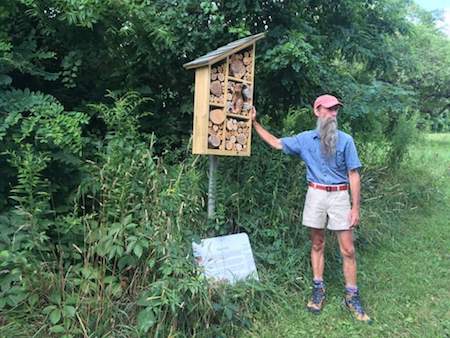 Scott Farm is a 40-acre farm in Dummerston, VT, that began cultivating in 1791. They grow heirloom fruit (mostly apples), which they sell at their farm market and to wholesale co-ops, markets, and distributors, including The FruitGuys! They received a $2,211.54 grant that will allow them to create six bee hotels and add pollinator plantings to their orchard. Their goal is to transition from pollination by rented honeybee hives to native bees.
Scott Farm is a 40-acre farm in Dummerston, VT, that began cultivating in 1791. They grow heirloom fruit (mostly apples), which they sell at their farm market and to wholesale co-ops, markets, and distributors, including The FruitGuys! They received a $2,211.54 grant that will allow them to create six bee hotels and add pollinator plantings to their orchard. Their goal is to transition from pollination by rented honeybee hives to native bees.
So far, they have been able to build four of their six bee hotels and establish their wildflower plantings. They’ve also incorporated educational signs about their project, posted along trails through their orchard. They’ve been happy to receive a lot of positive feedback from their community and farm visitors. Assistant orchard manager Ali Stevenson said, “It’s been great seeing people get excited about native pollinators and leave inspired after hearing about our project and projects like ours.”
Many Forks Farm
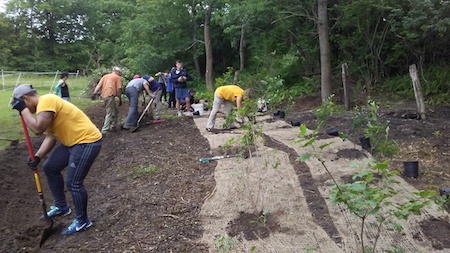 Many Forks Farm is a 7.5-acre farm in Massachusetts that produces vegetables, herbs, flowers, mushrooms, ginger, and berries. Due to changing weather patterns, they’ve experienced flooding in their fields in recent years. In order to help mitigate this problem, they received a $4,070 grant to create swales and berms planted with native perennials to improve drainage and provide habitat for beneficial insects.
Many Forks Farm is a 7.5-acre farm in Massachusetts that produces vegetables, herbs, flowers, mushrooms, ginger, and berries. Due to changing weather patterns, they’ve experienced flooding in their fields in recent years. In order to help mitigate this problem, they received a $4,070 grant to create swales and berms planted with native perennials to improve drainage and provide habitat for beneficial insects.
They’ve almost completed work in the swales and ditches and have planted berms with blueberries and native grasses. Though they haven’t had as much rain this year, owner Sharon Wyrrick said that the swales are functioning well, and there’s been no standing water in their fields. They’ve also done a lot of community outreach this summer. Wyrrick said, “A real highlight was a farm visit by students from the kindergarten class at Clarksburg Elementary School, along with their teacher, and the students’ parents.” Due to the trip’s success, Many Forks may be looking forward to more class visits in the future.
Windswept Acres
 Windswept Acres, a veteran-owned 3-acre farm in Chino Valley, AZ, grows and pickles a variety of vegetables, which they sell at farmers markets. They received a $4,885.20 grant to complete two hoop houses to help extend their growing season, plant pollinator-friendly perennials, and add beehives.
Windswept Acres, a veteran-owned 3-acre farm in Chino Valley, AZ, grows and pickles a variety of vegetables, which they sell at farmers markets. They received a $4,885.20 grant to complete two hoop houses to help extend their growing season, plant pollinator-friendly perennials, and add beehives.
Unfortunately, they’ve had a challenging summer dealing with family emergencies. However, they have cleared areas for their hoop houses and are hopeful about getting back on track soon.
Huidekoper Ranch
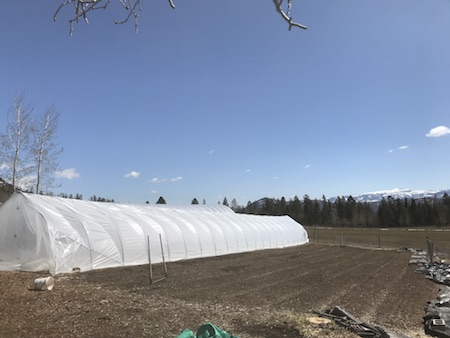 Huidekoper Ranch is a 1-acre farm in Wilson, WY, that produces organically grown salad greens, tomatoes, root vegetables, and microgreens. They received a $3,400 grant to purchase two gothic-style caterpillar tunnels to help extend their growing season, increase food production, and add cover crops into the rotation to increase soil health.
Huidekoper Ranch is a 1-acre farm in Wilson, WY, that produces organically grown salad greens, tomatoes, root vegetables, and microgreens. They received a $3,400 grant to purchase two gothic-style caterpillar tunnels to help extend their growing season, increase food production, and add cover crops into the rotation to increase soil health.
At Huidekoper Ranch, they were able to quickly put their funding to good use. Both of their new caterpillar tunnels were installed and planted by May 8th. Though they faced a few challenges transitioning to a new system, the warmer soil and air in the tunnels helped get their early salad greens, beets, and carrots off to a good start. They were also able to grow more tomatoes as well as zucchini, squash, and cucumbers, which is difficult in their cold climate. Head farmer, Bent Tyc said, “Our clients have been so excited to have the new produce in their hands, especially since these items are quite rarely grown here in our valley.”
Sisterland Farms
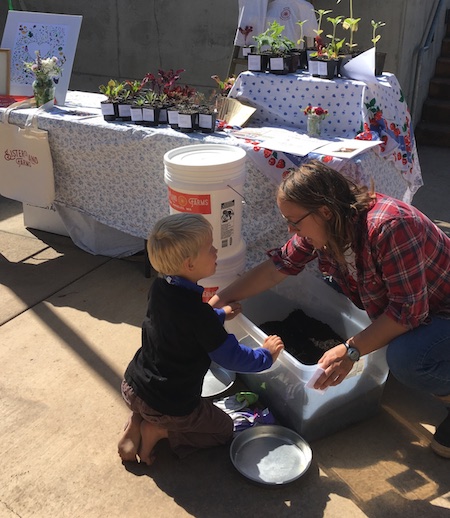 Sisterland Farms, a 2-acre, woman-owned and trans person–operated farm in Port Angeles, WA, produces fruit, vegetables, and flowers, which they sell through a CSA and farmers markets. They received a $3,541 grant to plant cover crops, start a community compost program, install rain barrels, create perennial hedgerows, and grow a food forest.
Sisterland Farms, a 2-acre, woman-owned and trans person–operated farm in Port Angeles, WA, produces fruit, vegetables, and flowers, which they sell through a CSA and farmers markets. They received a $3,541 grant to plant cover crops, start a community compost program, install rain barrels, create perennial hedgerows, and grow a food forest.
So far, they’ve successfully started a city-wide composting program and begun work building native hedgerows. Farm manager Arlene Jenson said, “Our most noticeable impact on the community has been with our compost program, which has attracted more clients than we can service at this time. We have determined to double our membership, and refocus (somewhat) on compost education and outreach, in the hopes that more farmers might commit to similar work.”
DoLittle Pastures
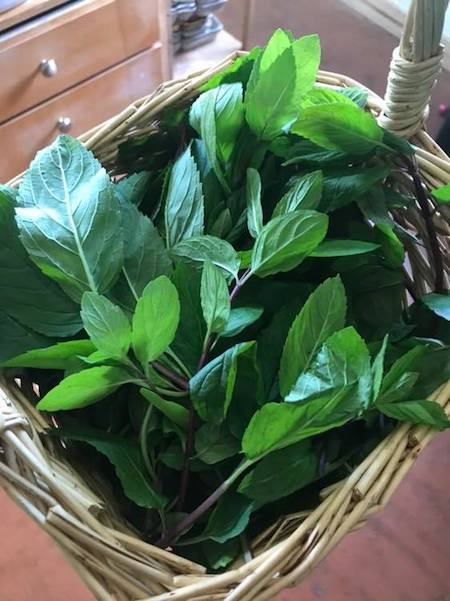 DoLittle Pastures, a 15-acre farm in Lacomb, OR, produces pastured meat and poultry, as well as woodland food and herbal products. The received a $3,700 grant to purchase seeds, fruit trees, compost, and other supplies that will help them create a sustainable food forest.
DoLittle Pastures, a 15-acre farm in Lacomb, OR, produces pastured meat and poultry, as well as woodland food and herbal products. The received a $3,700 grant to purchase seeds, fruit trees, compost, and other supplies that will help them create a sustainable food forest.
This summer, DoLittle Pastures has been able to add 100 locally-sourced fruit trees to their site. They’ve also been rotating livestock, including turkeys, chickens, ducks, hogs, and rabbits, through their new food forest. The animals help clear brush and increase soil fertility.
Funks Grove Heritage Farm
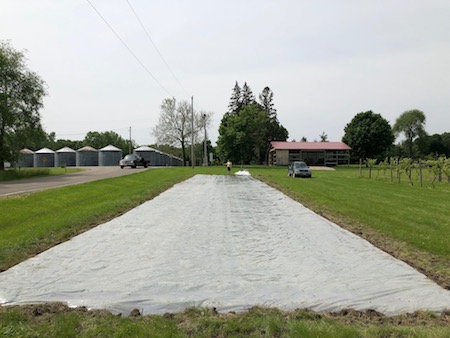 Funks Grove Heritage Farm is a 9-acre farm in McLean, IL, that produces small grains and fruit. They received a $2,526.99 grant to create habitats for beneficial insects and animals, by installing 10 bee boxes, four bat boxes, two owl boxes, and two large plots of pollinator plantings.
Funks Grove Heritage Farm is a 9-acre farm in McLean, IL, that produces small grains and fruit. They received a $2,526.99 grant to create habitats for beneficial insects and animals, by installing 10 bee boxes, four bat boxes, two owl boxes, and two large plots of pollinator plantings.
So far, they’ve purchased all their bee, bat, and owl boxes and have been preparing areas for fall pollinator plantings. They’re also looking forward to fall tours, when they’ll be able to show off their new pollinator and wildlife habitats.
La Semilla Community Farm
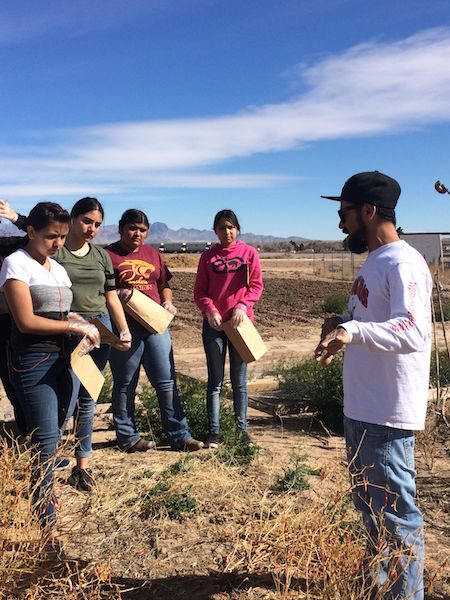 La Semilla Community Farm, a certified bee-friendly, nonprofit, 7-acre farm in Anthony, NM, produces vegetables, herbs, and honey. They received a $4,196 grant to purchase trees and plants for a native vegetation buffer and windbreak.
La Semilla Community Farm, a certified bee-friendly, nonprofit, 7-acre farm in Anthony, NM, produces vegetables, herbs, and honey. They received a $4,196 grant to purchase trees and plants for a native vegetation buffer and windbreak.
This season they’ve designed and purchased supplies for an irrigation system for their windbreak and created a farm road to access it. They’ve also purchased trees for the windbreak but won’t be planting until later in the fall, when the weather is better suited. They’ve also been busy in their community this summer. Farm manager Josh Jasso said, “The farm hosted You Grow Chica!, an all-girls summer camp, which focused on empowerment and the environment; a two-month youth program called Raíces, which connects teenagers with heritage, food, and the land; and a community event to celebrate food and everyone involved.” They also hosted workshops and trainings for beginner farmers.
Veterans Employment Basecamp
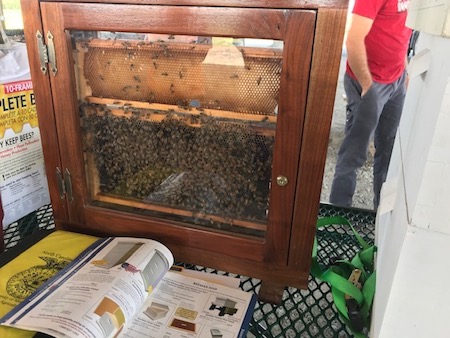 Veterans Employment Base Camp (VEBCOG) is a nonprofit organization designed to reintroduce unemployed, disabled, and homeless veterans back into the workforce as productive, employable individuals. Located in New Bern, NC, VEBCOG uses horticulture therapy to help rehabilitate veterans through growing organic fruits and vegetables to sell at farmers markets and distribute to disabled veterans. They received a $4,400 grant to purchase two Slovenian beehives, which are more accessible to disabled beekeepers.
Veterans Employment Base Camp (VEBCOG) is a nonprofit organization designed to reintroduce unemployed, disabled, and homeless veterans back into the workforce as productive, employable individuals. Located in New Bern, NC, VEBCOG uses horticulture therapy to help rehabilitate veterans through growing organic fruits and vegetables to sell at farmers markets and distribute to disabled veterans. They received a $4,400 grant to purchase two Slovenian beehives, which are more accessible to disabled beekeepers.
VEBCOG was able to order their two beehives. Additionally, they acquired a utility trailer with an angled flatbed and stability bars so they can move the hives around.
JSM Organics
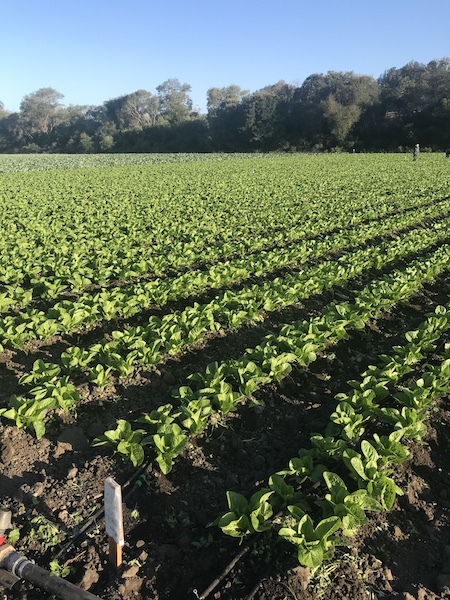 JSM Organics, a 60-acre farm in Aromas, CA, grows organic vegetables, cut flowers, strawberries, raspberries, and blackberries. They received a $5,000 grant to purchase a beneficial seed mix, pyro-weeder, beekeeping equipment, a quick-cut greens harvester, and a low-energy greens dryer.
JSM Organics, a 60-acre farm in Aromas, CA, grows organic vegetables, cut flowers, strawberries, raspberries, and blackberries. They received a $5,000 grant to purchase a beneficial seed mix, pyro-weeder, beekeeping equipment, a quick-cut greens harvester, and a low-energy greens dryer.
So far, they’ve grown an amazing lettuce crop thanks in part to their success with their pyro-weeder. Their harvester and dryer will also be integral in getting this crop to market.
A progress update from SweetRoot Farm will be coming soon!
What’s Next?
Keep following along with The FruitGuys Community Fund. The 2019 grantees will share final highlights from their sustainability projects at the end of the year. Do you know a small, independent farmer? The FruitGuys Community Fund will open the 2020 grant cycle in December. For more information, visit: fruitguyscommunityfund.org/apply.




